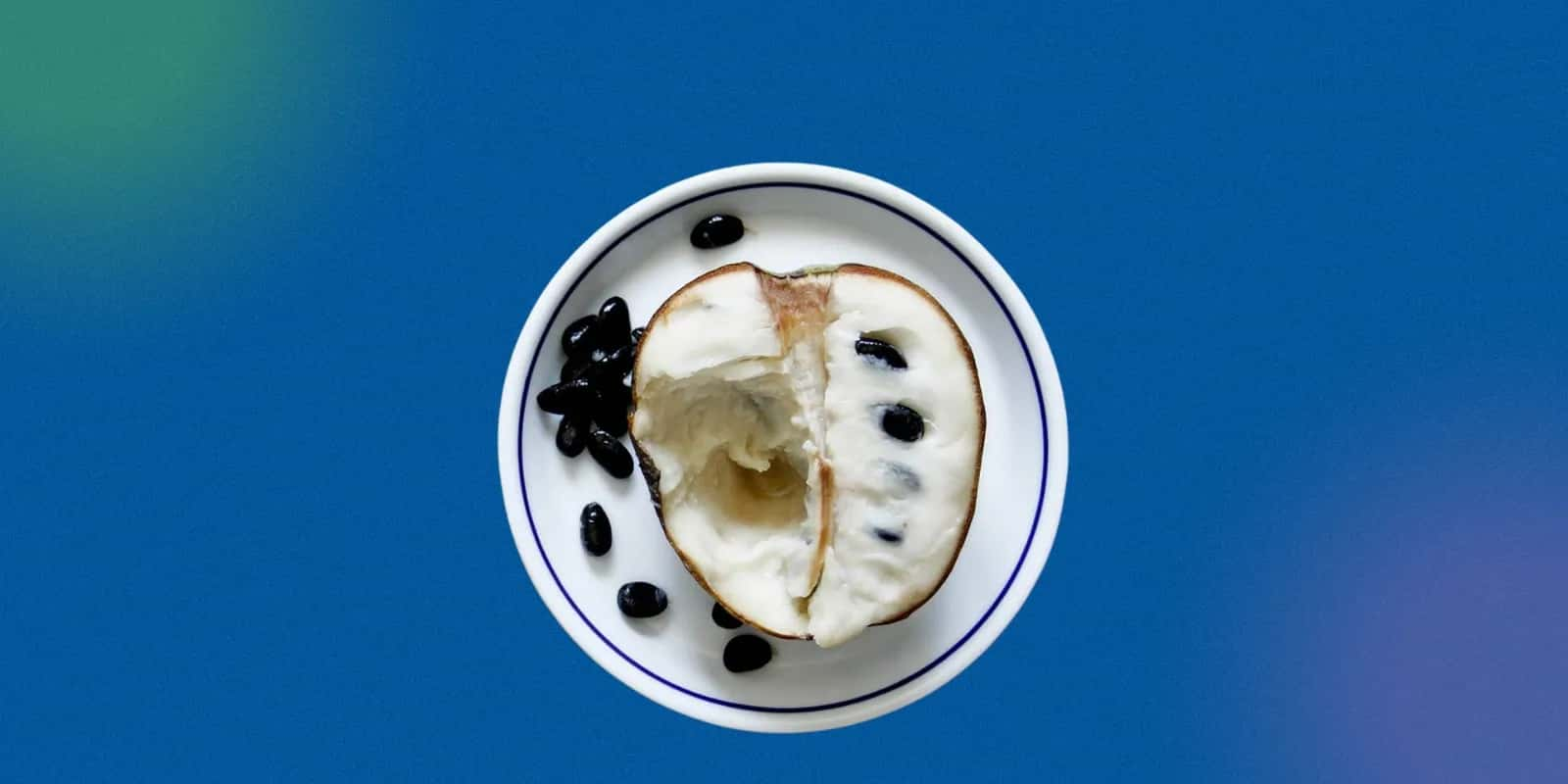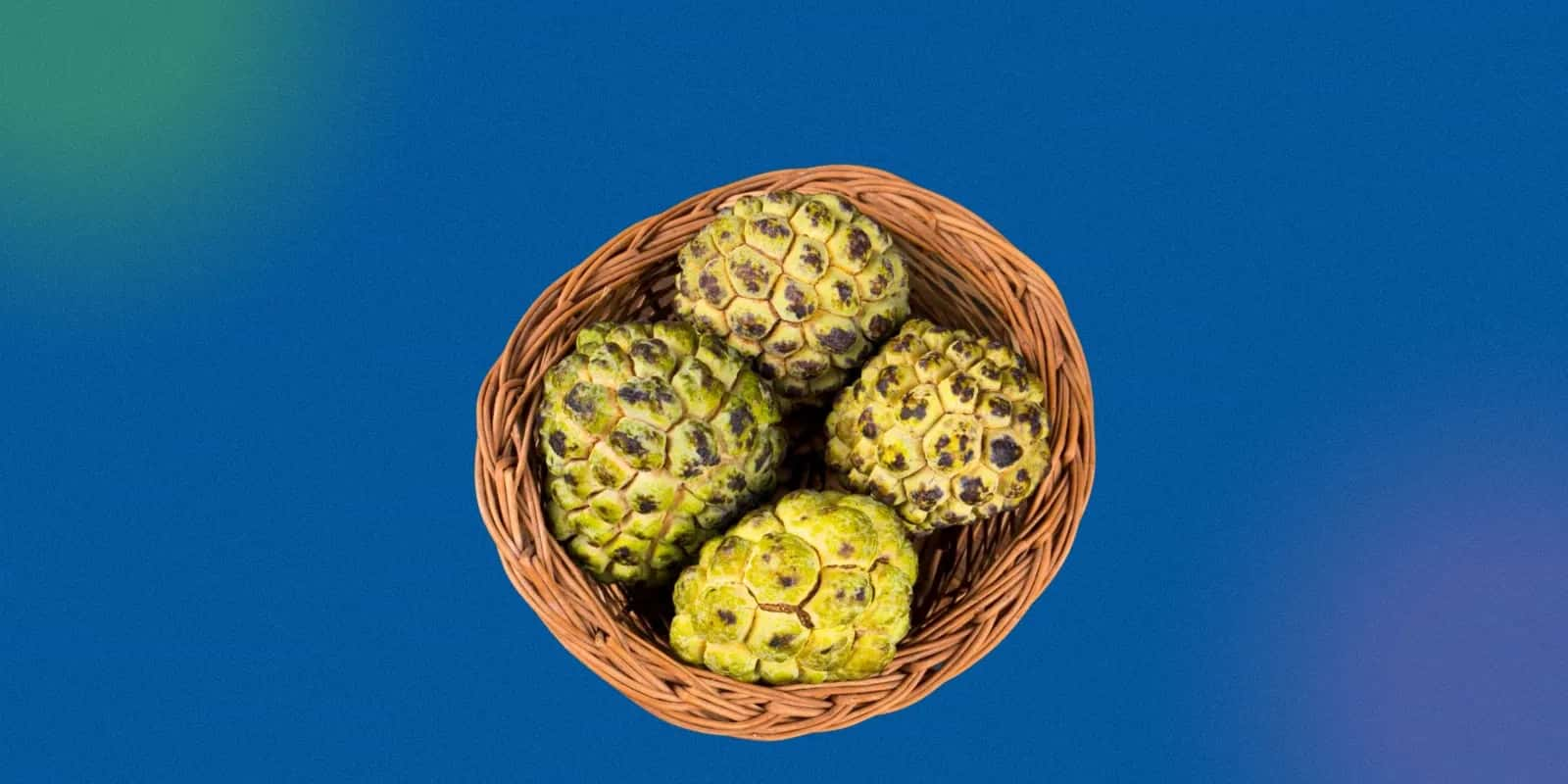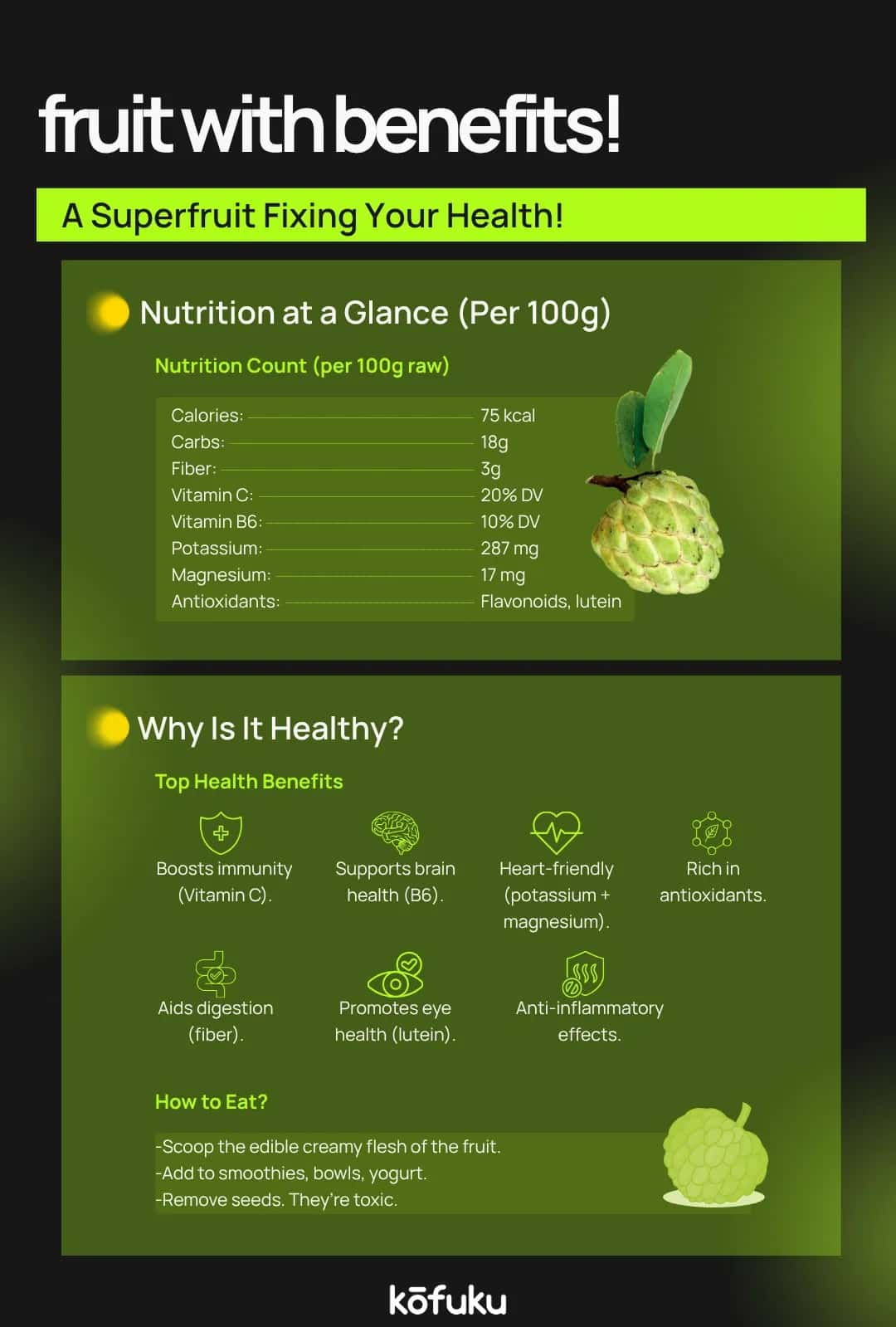Home
Blogs
Wellness Corner
7 Surprising Benefits of Cherimoya (Custard Apple) and Its Nutritional Value
7 Surprising Benefits of Cherimoya (Custard Apple) and Its Nutritional Value

Introduction
Ever tasted a fruit so creamy and sweet that it feels like it’s melting in your mouth? That’s the magic of custard apple, also known as cherimoya. Once praised by Mark Twain as “the most delicious fruit known to man,” It is a tropical fruit known for its creamy, custard-like texture and sweet, complex flavour.
Although originally native to the Andes, cherimoya is now grown throughout regions such as India, Spain, and South Asia. This heart-shaped, green fruit is a true powerhouse of nutrition and hidden health benefits. This article will explore the benefits of cherimoya, its nutritional value, and how you can incorporate this amazing fruit into your diet.
What is Cherimoya? Understanding the Fruit and Its Nutritional Profile
Cherimoya belongs to the Annonaceae family and originates from Ecuador, Peru, and Central America. The flesh of a cherimoya is creamy and sweet with flavour notes of banana, pineapple, strawberry, and papaya. Also called "ice-cream fruit", it is best when eaten ripe and chilled, scooped with a spoon around the seeds. You need to remove the skin and pulp before eating a custard apple, as the seeds are neurotoxic.
Cherimoya contains ~75 calories per 100g, with 18-24g of carbohydrates, ~2g of protein, ~5g of fibre, and virtually no fat. It’s a moderate source of vitamin C, B6, riboflavin, potassium, magnesium, and copper. Cherimoya is a treasure chest of antioxidants like flavonoids, carotenoids (lutein specifically), and kaurenoic acid, which aid in combating oxidative stress and inflammation.
Benefits of Custard Apple
Given its nutritional content, custard apple is beneficial for your body in more ways than one. Here are some of these advantages:
1. Rich Source of Essential Nutrients and Antioxidants
Cherimoya has a great profile of vitamin C and antioxidant compounds, including kaurenoic acid, flavonoids, and carotenoids. Antioxidants neutralise free radicals, lower inflammation, and reduce the risks of chronic diseases, including heart disease and cancer. Antioxidants also help to strengthen the immune system, thus making you less vulnerable to infections.
2. Supports Heart Health by Regulating Blood Pressure
Cherimoya’s potassium and magnesium content help relax the tension in blood vessel walls and, in turn, lower hypertension. Additionally, regular consumption can also support cardiovascular health and lower cholesterol levels.
3. Helps Improve Digestive Health with Its High Dietary Fibre
Cherimoya has about five grams of dietary fibre per 100 g, which supports bowel regularity, helps manage blood sugar, and nourishes healthy gut bacteria. Fibre also protects the digestive tract and reduces the risks of some inflammatory bowel diseases.

4. May Boost Immune System and Fight Inflammation
Custard apples are rich in antioxidants, particularly vitamin C, which is among the most potent immune system boosters. Antioxidants reduce cell-damaging free radicals, oxidative stress, and inflammation. Custard apples contain natural compounds that support white blood cell function, your body's frontline defence against infections.
5. Custard Apple in Pregnancy: Nutritional Benefits and Safety Tips
Cherimoya provides fibre, vitamin C, potassium, folate, and vitamin B6 during pregnancy, nutrients that support digestion, immunity, fluid balance, and foetal neural development. However, pregnant women should remove the seeds completely and eat 1–2 servings each week to minimise the risk of low-level exposure to toxins like annonacin. Pregnant women should also consult their doctor before making any dietary changes, to ensure it’s safe.
6. Supports Brain Health and Cognitive Function
Custard apple contains nutrients, such as vitamin B6, which is essential for brain development and function. Vitamin B6 helps produce serotonin and dopamine, which are essential for regulating mood, memory, and reasoning. Custard apple is beneficial as its antioxidants help shield the brain and its cells from oxidative damage, and reduce the risk of neurodegenerative disorders, like Alzheimer’s disease. Eating custard apple may promote more mental clarity, focus, and overall brain well-being.
7. May Promote Healthy Skin and Prevent Signs of Ageing
The vitamin C, B vitamins, and minerals in cherimoya may help collagen formation, skin healing, and hair growth. Copper helps with connective tissues and pigmentation. Potassium and magnesium help the body produce energy and enable nerve and muscle function. Cherimoya’s antioxidants eliminate free radicals produced by UV rays, which cause skin damage. These antioxidants can help with premature ageing and even reduce fine lines and spots.

How to Incorporate Cherimoya Into Your Diet
Here are some safe ways to eat cherimoya:
1. Eat it fresh after scooping the flesh out of the fruit when it is soft, and make sure to remove the seeds and peel beforehand.
2. Make into smoothies with yoghurt or milk, especially since cherimoya has a smooth, creamy taste that can make your drinks taste tropical.
3. You can make frozen pops or custards using only the blended pulp of cherimoya.
4. Mix with cereal, oatmeal, or fruit salads for some natural sweetness and nutrition.
Conclusion
Cherimoya is a tropical treat with more than just delicious flavour; it's a nutritional goldmine packed with antioxidants, fibre, vitamins, and minerals in every bite. You can enjoy it as a chilled snack on its own, blend it into a dessert, or pair it with savoury flavours. It is a versatile fruit that helps boost your immunity and health, including digestion, heart health, mood, and eye health.
However, eat cherimoya in moderation, particularly if you’re pregnant or have any other health issues like diabetes or kidney problems. With mindful consumption and as part of a balanced diet, cherimoya can be a wholesome, delicious, refreshing treat, bringing tropical flavour onto your plate and providing wellness benefits, all in one spoonful.

FAQs
Q. What are the top apple custard benefits?
A. Cherimoya, or custard apple, is a source of fibre, vitamins C and B6, potassium, and antioxidants. It supports immunity, digestion, heart, and skin health.
Q. How many calories are in a custard apple?
A. The calories depend on the size and sugar content, but there are approximately 75-120 calories for a serving of 100-175 g.
Q. Is custard apple safe during pregnancy?
A. Yes, eating ripe custard apple in moderation can support prenatal nutrition, but ensure to remove all seeds and peel. Consult your doctor immediately if you have any doubts or notice any signs.
Q. What nutrients are in custard apple?
A. Custard apple is rich in vitamin C, B6, potassium, dietary fibre, copper, magnesium, riboflavin, and carotenoids such as lutein.
Q. How does cherimoya improve digestion and immunity?
A. Dietary fibre regulates bowel movement while vitamin C and other antioxidants strengthen the immune system and inhibit inflammation.

10 Health Benefits of Apple Cider Vinegar You Should Know

10 Health Benefits of Pomegranate

5 Healthy Benefits of Drinking Aloe Vera and Amla Juice Daily

ABC Juice: Benefits, Recipe, and Side Effects

Benefits of CCF Tea That You Should Know About

Chlorophyll Water: 10 Benefits and Risks of the Wellness Trend

Benefits of Coconut Sprouts: Nutrition in a Nutshell


